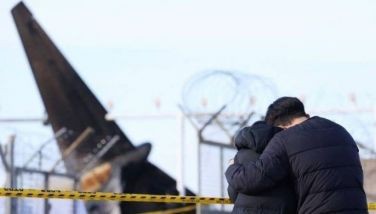Pope in Central African Republic with peace message
BANGUI, Central African Republic — Pope Francis arrived Sunday in Central African Republic, making the final stop of his first trip to Africa in a country where violence between Christian and Muslim militants has forced nearly 1 million from their homes over the last two years and divided the capital city.
The precarious security situation in Bangui, the capital, raised the possibility in recent weeks that the pope could cancel his visit. Less than a year ago, mobs beat Muslims to death in the streets, even decapitating and dismembering some. While sectarian clashes have left at least 100 people dead over the last two months, in recent days Bangui has been relatively free of gunfire.
Many hope that the pope's message of peace and reconciliation can encourage longer-term stability in this nation of 4.8 million. As part of his trip, the pope plans to visit a camp for displaced people where Christians have sought refuge. He also will venture into the capital's Muslim enclave, known as PK5, to meet with community leaders and the uprooted.
Interim President Catherine Samba-Panza told reporters Saturday that the pope is being awaited as a "peace messenger."
"Many Central Africans hope that the messages he will deliver will inspire a national mobilization and realization that Central Africans learn to accept each other again, learn to live together again and learn to go toward peace and reconstruction of their country," she said.
At the displacement camp at Bangui's airport, where thousands have lived for nearly two years, there is a sense that things now are the worst they've been since December 2013. Sandrine Sanze and her family are now back for a second time after the recent clashes, having initially spent nine months at the airport camp.
"It is our prayer that with the pope's visit that peace will return, we can go home and life can start anew," she said, sitting on the ground outside her home of scrap metal that she and her husband dragged to the site.
The situation remains tense and fragile: Bangui's archbishop travels into the city's Muslim enclave under escort from armed peacekeepers. The city of Bangui has long been under a nightly curfew of 8 p.m. as gun battles have rung out after dark in the flashpoint neighborhoods.
The United Nations sought to assure the Vatican that security was under control on the eve of the pope's arrival. The head of the U.N. operation, Parfait Onanga-Anyanga, told Vatican Radio that U.N. peacekeepers and French troops were confident that they could keep the pope and his entourage safe.
"Certainly, you can't exclude that a saboteur might try to disrupt the calm, but we're ready to respond in the most efficient way possible," Onanga-Anyanga said.
The bloodshed dates back to early 2013, when a coalition of mostly Muslim rebel groups from the country's anarchic north overthrew the Christian president. Their power grab was more about greed than ideology, yet their rule saw tensions rise as the rebels carried out brutal attacks on civilians. After the rebel leader stepped aside in early 2014, a wave of retaliatory violence by Christian fighters called the anti-Balaka forced most of the capital's Muslims to flee. Human Rights Watch said there are only 15,000 Muslims remaining in Bangui, down from around 122,000.
Central African Republic was organizing democratic elections for December when the death of a young Muslim taxi driver in late September reignited tensions. Within hours, the Muslim fighters, called the Seleka, retaliated in attacks on Christians in the neighborhoods surrounding PK5.
The Muslim community in PK5 is eager to welcome Pope Francis, Onanga-Anyanga said. Earlier this week, workers were busily repainting the cream-colored mosque he is due to visit a vibrant mint green.
"The opportunity of the pope's visit reminds us that aside from being a head of state, he's also a spiritual leader," he said. "And it's perhaps in this dimension that the Central Africans can find the energy, the inspiration so that the country can find the will to reconcile with itself, and that it can plan a future in which all the Central African children can live in unity."
- Latest
- Trending
































